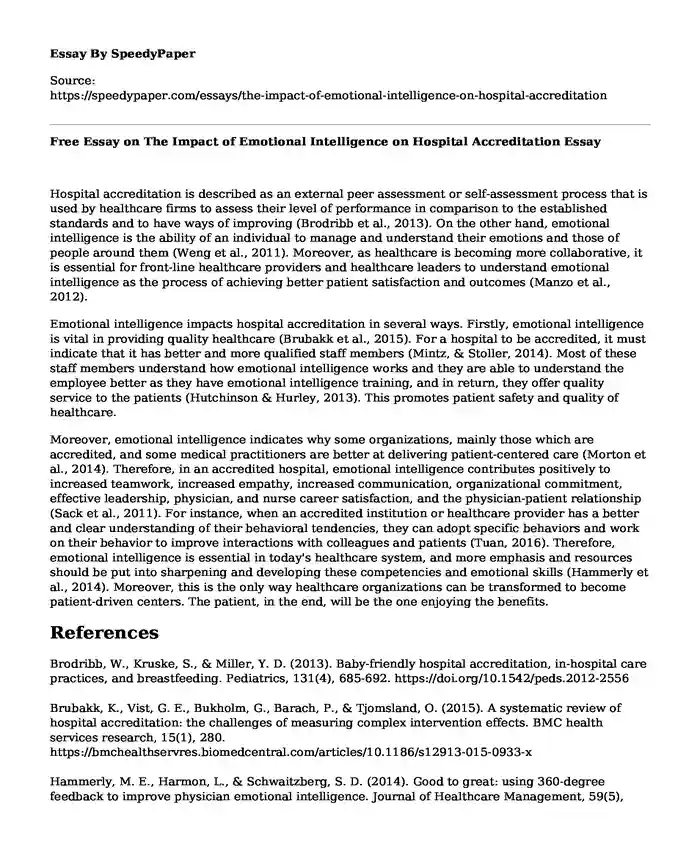
| Type of paper: | Essay |
| Categories: | Healthcare Nursing care Emotional intelligence Customer service |
| Pages: | 3 |
| Wordcount: | 622 words |
Hospital accreditation is described as an external peer assessment or self-assessment process that is used by healthcare firms to assess their level of performance in comparison to the established standards and to have ways of improving (Brodribb et al., 2013). On the other hand, emotional intelligence is the ability of an individual to manage and understand their emotions and those of people around them (Weng et al., 2011). Moreover, as healthcare is becoming more collaborative, it is essential for front-line healthcare providers and healthcare leaders to understand emotional intelligence as the process of achieving better patient satisfaction and outcomes (Manzo et al., 2012).
Emotional intelligence impacts hospital accreditation in several ways. Firstly, emotional intelligence is vital in providing quality healthcare (Brubakk et al., 2015). For a hospital to be accredited, it must indicate that it has better and more qualified staff members (Mintz, & Stoller, 2014). Most of these staff members understand how emotional intelligence works and they are able to understand the employee better as they have emotional intelligence training, and in return, they offer quality service to the patients (Hutchinson & Hurley, 2013). This promotes patient safety and quality of healthcare.
Moreover, emotional intelligence indicates why some organizations, mainly those which are accredited, and some medical practitioners are better at delivering patient-centered care (Morton et al., 2014). Therefore, in an accredited hospital, emotional intelligence contributes positively to increased teamwork, increased empathy, increased communication, organizational commitment, effective leadership, physician, and nurse career satisfaction, and the physician-patient relationship (Sack et al., 2011). For instance, when an accredited institution or healthcare provider has a better and clear understanding of their behavioral tendencies, they can adopt specific behaviors and work on their behavior to improve interactions with colleagues and patients (Tuan, 2016). Therefore, emotional intelligence is essential in today's healthcare system, and more emphasis and resources should be put into sharpening and developing these competencies and emotional skills (Hammerly et al., 2014). Moreover, this is the only way healthcare organizations can be transformed to become patient-driven centers. The patient, in the end, will be the one enjoying the benefits.
References
Brodribb, W., Kruske, S., & Miller, Y. D. (2013). Baby-friendly hospital accreditation, in-hospital care practices, and breastfeeding. Pediatrics, 131(4), 685-692. https://doi.org/10.1542/peds.2012-2556
Brubakk, K., Vist, G. E., Bukholm, G., Barach, P., & Tjomsland, O. (2015). A systematic review of hospital accreditation: the challenges of measuring complex intervention effects. BMC health services research, 15(1), 280. https://bmchealthservres.biomedcentral.com/articles/10.1186/s12913-015-0933-x
Hammerly, M. E., Harmon, L., & Schwaitzberg, S. D. (2014). Good to great: using 360-degree feedback to improve physician emotional intelligence. Journal of Healthcare Management, 59(5), 354-366. https://journals.lww.com/jhmonline/Abstract/2014/09000/Good_to_Great__Using_360_Degree_Feedback_to.9.aspx
Hutchinson, M., & Hurley, J. (2013). Exploring leadership capability and emotional intelligence as moderators of workplace bullying. Journal of nursing management, 21(3), 553-562. https://doi.org/10.1111/j.1365-2834.2012.01372.x
Manzo, B. F., Brito, M. J., & Corrêa, R. A. (2012). Implications of hospital accreditation on the everyday lives of healthcare professionals. Revista da Escola de Enfermagem da USP, 46(2), 388-394. https://bmchealthservres.biomedcentral.com/articles/10.1186/s12913-015-0784-5
Mintz, L. J., & Stoller, J. K. (2014). A systematic review of physician leadership and emotional intelligence. Journal of graduate medical education, 6(1), 21-31. https://www.jgme.org/doi/pdf/10.4300/JGME-D-13-00012.1
Morton, J. M., Garg, T., & Nguyen, N. (2014). Does hospital accreditation impact bariatric surgery safety?. Annals of Surgery, 260(3), 504-509. doi: 10.1097/SLA.0000000000000891
Sack, C., Scherag, A., Lütkes, P., Günther, W., Jöckel, K. H., & Holtmann, G. (2011). Is there an association between hospital accreditation and patient satisfaction with hospital care? A survey of 37 000 patients treated by 73 hospitals. International Journal for Quality in Health Care, 23(3), 278-283. https://doi.org/10.1093/intqhc/mzr011
Tuan, L. T. (2016). The chain effect from human resource-based clinical governance through emotional intelligence and CSR to knowledge sharing. Knowledge Management Research & Practice, 14(1), 126-143. https://doi.org/10.1057/kmrp.2014.23
Weng, H. C., Hung, C. M., Liu, Y. T., Cheng, Y. J., Yen, C. Y., Chang, C. C., & Huang, C. K. (2011). Associations between emotional intelligence and doctor burnout, job satisfaction and patient satisfaction. Medical education, 45(8), 835-842. https://onlinelibrary.wiley.com/doi/full/10.1111/j.1365-2923.2011.03985.x
Cite this page
Free Essay on The Impact of Emotional Intelligence on Hospital Accreditation. (2023, Aug 01). Retrieved from https://speedypaper.com/essays/the-impact-of-emotional-intelligence-on-hospital-accreditation
Request Removal
If you are the original author of this essay and no longer wish to have it published on the SpeedyPaper website, please click below to request its removal:
- Free Essay about Lobbyist Influence
- Free Essay on Customer Loyalty for Airlines with a Survey Example
- Free Research Paper Sample Regionalism in The Post-Cold War Era
- Research Paper Sample on the Klinefelter Syndrome (XXY)
- Essay Sample on Delightful Living in Macomb County
- Report on Having Full-Time Workers
- Free Essay Sample: Course Reflective Summary
Popular categories




